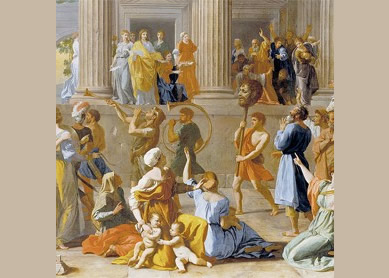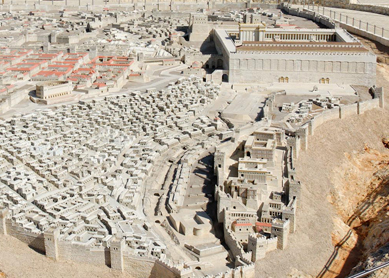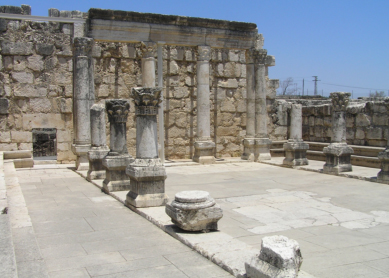Although neutral on their face, place names can be loaded with assumptions about power and politics. In contemporary America, city names like “Vail” and “Tijuana” and designations such as “inner city,” “the west,” and “fly-over states” conjure up old prejudices. This is true also in the ancient world, and few place names are as symbolically rich and multifaceted as the city of Zion.
The biblical tradition paints Zion as a Jebusite fortress that King David captured through war (2Sam 5:7; 1Chr 11:5). The ancient king subsequently adopted it as his capital city, and, although he renamed the site “City of David,” the earlier name of Zion lived on as a synonym (1Kgs 8:1-2; 2Chr 5:2). In the Bible, the term most frequently appears in the Psalms to refer to Jerusalem as the city of God. It is the place “which God established forever” (Ps 48:8; see also Ps 87:1) and continues to protect as a “sure defense” (Ps 48:3). In Ps 87 Zion is imaginatively portrayed as the birthplace of all the people, and Israel is called “children of Zion” in Ps 149:2. In the New Testament, the term comes to denote a heavenly city where God and the faithful community will dwell at the end of the age (Heb 12:22; Rev 21).
Is Zion a military fortress, God’s dwelling, or God’s people?
Although originally used by David as a military fortress to protect his palace from invaders, “Zion” came also to refer both to God’s dwelling on earth as well as God’s people. Similar to traditions of other ancient gods, poetic texts in the Hebrew Bible depict God battling the primordial powers of chaos and triumphantly choosing Zion as a place to dwell. In contrast to the historical narratives in the Hebrew Bible, the role of David and Solomon as agents who conquered the city of Zion and built the temple is significantly diminished in the Psalms—it is God who chose Zion (Ps 132:13), God who built the temple in Zion (Ps 78:68-69), and God who rules from Zion as universal king (Ps 99:1-2). As the dwelling place of God on earth (Ps 9:11; Ps 76:2; Isa 8:18), Zion is protected by God from every military advance (Ps 48; Ps 76:3). It is also the place to which the people of the world come to worship and pay homage (Mic 4:1-2) and from where God’s blessing emanates throughout the earth (Ps 128:5; Ps 134:3).
At points, Zion also symbolizes God’s people. The nation of Israel is called “Zion’s children” in Ps 149:2. In an evocative description of Jerusalem’s destruction in Isa 49, Zion speaks out to accuse God of neglect: “The LORD has abandoned me, The LORD has forgotten me” (Isa 49:14). God quickly rebuts Zion’s accusation by asking “Can a woman forget her nursing child, or fail to pity the child of her womb?” (Isa 49:15). And in a striking assurance based on God’s protective power and the strength of natural landscapes, those who trust in God are said to be “like Mount Zion,” that is, secure and everlasting (Ps 125:1).
Is Zion a Woman?
Throughout the Hebrew Bible, the city of Jerusalem and its inhabitants are poetically imaged as “Daughter Zion” or “Daughter of Zion.” This imagery is related to the ancient practice of personifying cities as women, with other examples from the Bible including “Daughter Babylon” (Ps 137:8-9; Isa 23:12) and “Daughter Tarsish” (Isa 23:10). Biblical texts poetically extend this imagery so that Zion is at times portrayed not only as daughter, but also as wife and mother.
As “Daughter Zion,” the city and its inhabitants are called to perform the role of leading the community in praise after military victory: “Rejoice greatly, O Daughter Zion … for your king comes to you, triumphant and victorious” (Zech 9:9). In the book of Lamentations, she also leads the community in lamenting the city’s military destruction by the hand of God: stretching out her hands she weeps over the defeat of her armies, saying “The LORD has rejected all my warriors in the midst of me; he has proclaimed a time against me to crush my young men” (Lam 1:15-17). At the time of restoration, Daughter Zion again leads the victory celebrations in praise of God’s work: after the divine anger “turned away,” Daughter Zion is instructed to “shout aloud and sing for joy … for great in your midst is the Holy One of Israel” (Isa 12:1, Isa 12:6; see also Zeph 3:14).
Female imagery for Zion also includes that of mother and wife. In the wake of the coming military destruction of Jerusalem and the land, the prophet Micah depicts Daughter Zion suffering “like a woman in labor” (Mic 4:10). Other references to Zion’s children include Lam 1:5, Lam 1:16. Evocatively, Ps 87 declares that “the LORD loves the gates of Zion” (Ps 87:2; see also Ps 78:68) Zion herself names her intimate relationship to the citizens of the world: “Among those who know me I mention Rahab and Babylon; Philistia too, and Tyre, with Ethiopia—‘This one was born there’ they say” (Ps 87:4). The Psalm closes with a joyful declaration of Zion’s ongoing role as the source of life: “singers and dances alike say [to Zion], ‘All my springs are in you’” (Ps 87:7).
Bibliography
- Maier, Christl M. Daughter Zion, Mother Zion. Minneapolis: Fortress, 2008.
- Hoppe, Leslie J. The Holy City: Jerusalem in the Theology of the Old Testament. Collegeville: Liturgical Press, 2000.
- Dow, Lois K. Fuller. Images of Zion: Biblical Antecedents for the New Jerusalem. Sheffield, Sheffield Phoenix Press, 2010.




